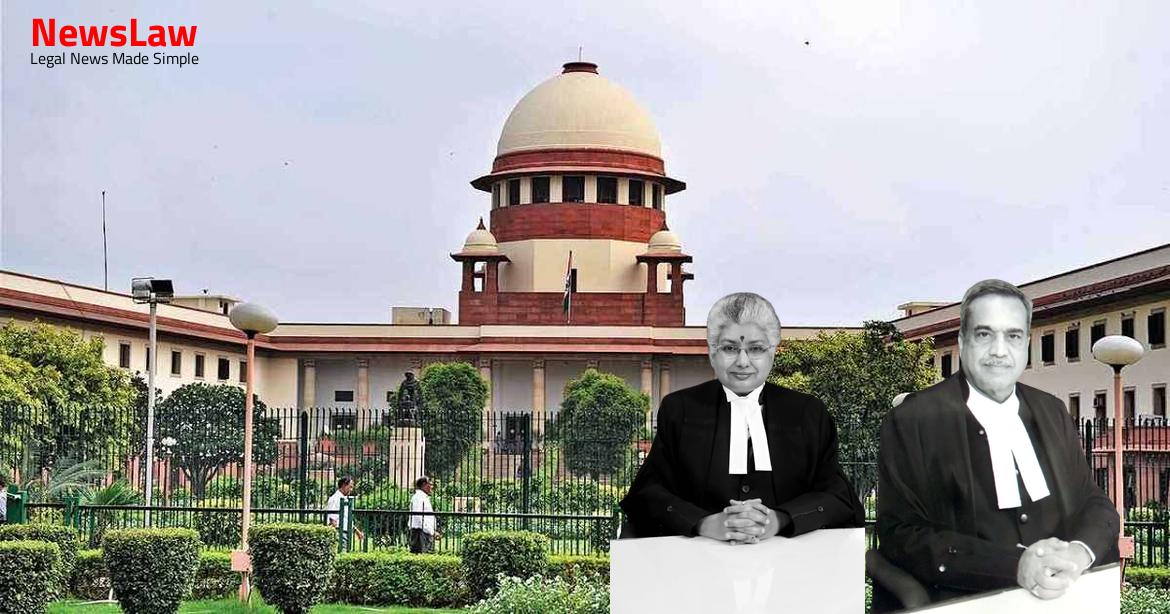In a significant legal battle concerning land dispute resolution, the Supreme Court of India has delivered a verdict upholding the specific performance decree. The case involved a dispute between the original plaintiff and the defendant regarding a land agreement. This ruling sets a precedent for similar cases in the future, shedding light on the intricacies of specific performance in land-related contracts.
Facts
- The Land Reforms Tribunal held that the appellant was holding excess land to the extent of 0.0013 cents.
- The appellant executed an agreement to sell in favor of the original plaintiff for a sale consideration of Rs.2,45,000.
- The defendant purchased the land in question from Y. Somayya Choudary, and the Land Tribunal considered it a bona fide transaction.
- The original plaintiff demanded the original sale deed and final order from the Tribunal, leading to the filing of a suit for specific performance of the agreement to sell.
- The suit was resisted by the defendant through a written statement, claiming an agreement to measure the land for the actual sale consideration and payment terms.
Also Read: Address Update Requirement: Legal Implications for Corporate Entities
Issue
- Plaintiff sought specific performance of the suit agreement of sale.
- Trial Court framed issues to determine plaintiff’s entitlement to specific performance or refund of advance sale consideration with interest.
- Three main issues were framed based on the pleadings of the parties.
- The issues focused on plaintiff’s readiness and willingness to perform the contract.
- The alternative relief of refund of advance sale consideration was also considered.
- The Trial Court aimed to determine the appropriate relief for the plaintiff.
Also Read: Army Discharge Case: Upholding Justice for Long Service Rendered
Arguments
- The defendant informed the plaintiff that the sale deed is filed in the land ceiling proceedings of Y. Somayya Choudary.
- The plaintiff was told by the defendant in a reply that the sale deed is in the court file and can be obtained from the court.
- Both courts erred in holding the defendant committed a breach of the contract.
- The plaintiff wanted a clear title before paying the balance sale consideration.
- There was a need to have the land measured before finalizing the sale.
- The plaintiff was always ready to pay the balance sale consideration upon fulfilment of the defendant’s part.
- The defendant failed to provide the sale deed, final certificate from the Land Tribunal, or measure the land.
- Failure to pay the balance consideration disentitled the plaintiff from specific performance decree.
- Concurrent findings suggest the defendant failed to perform duties under the contract.
- The plaintiff eventually paid the balance sale consideration from funds obtained in 1993 property sale.
- The agreement did not specify that the sale deed could only be executed after the land was measured.
- The plaintiff lacked funds to pay the balance consideration initially.
- The courts erred in granting specific performance decree after many years causing hardship to the defendant.
- Granting a decree for specific performance would be oppressive and unfair to the defendant.
- Decree for specific performance is a discretionary relief and should not have been granted in this case.
- The plaintiff was aware of the defendant’s property purchase and land ceiling proceedings before entering the agreement.
- The defendant admitted the land needed to be measured before executing the sale deed.
- The plaintiff managed to deposit the balance sale consideration after an extended period from a property sale in 1993.
- The defendant was not solely responsible for the breach of contract.
- The plaintiff was not always ready and willing to perform his part of the agreement.
- The agreement stated the balance sale consideration was to be paid within three months of execution.
- Y. Somayya Choudary executed the sale deed to save the property from the Agricultural Land Ceiling Act.
- The defendant-vendor must fulfill her part of the contract before the plaintiff is required to deposit any amount.
- The plaintiff deposited the balance sale consideration promptly upon the trial court’s direction to do so to demonstrate his bonafides.
- The plaintiff’s ability to deposit the amount in 1993 from a property sale does not imply he was previously unable to pay.
- Relies on the decision of the court in Narinderjit Singh v. North Star Estate Promoters Limited (AIR 2012 SC 2035) for support.
Also Read: Justice Served: Supreme Court Ruling on CBI Inquiry against Army Officer
Analysis
- The High Court and trial Court rightly passed a decree for specific performance as the vendee demonstrated readiness and deposited the balance sale consideration as directed.
- The appellant did not plead hardship in the written statement regarding specific performance decree causing undue hardship.
- The case of A. Maria Angelena v. A.G. Balkis Bee was referred where raising hardship plea for the first time was not entertained.
- The vendor’s failure to provide necessary title papers and documents was highlighted by both the trial Court and High Court.
- The plaintiff insisted on receiving original sale deed and land ceiling papers which the vendor failed to provide.
- Concurrent findings stated that the appellant-vendor did not fulfill her part of the contract.
- No measurement of land or final amount agreement was made, hence no obligation for balance sale consideration arose.
- Issues regarding the delivery of necessary documents and the vendor’s lack of performance were emphasized in the judgment.
- The appellant failed to prove that the plaintiff was not ready and willing to perform his part of the contract.
- Date discrepancies and lack of evidence regarding document production were noted by the High Court during the analysis.
- The agreement to sell was dated 30.12.1985 but the actual deposit was made in the year 1993 as directed by the trial Court.
- Vendor’s plea on hardship cannot be considered as it was not raised in the written statement.
- No relevant precedent provided by the appellant’s Senior Advocate.
- The decisions cited are not applicable to the facts of the case.
- The findings of the trial Court and High Court are confirmed.
- The appeals are dismissed.
Decision
- 1.1
- 1.2
- 1.3
Case Title: BEEMANENI MAHA LAKSHMI Vs. GANGUMALLA APPA RAO (SINCE DEAD) BY LRS.
Case Number: C.A. No.-004537-004538 / 2017



